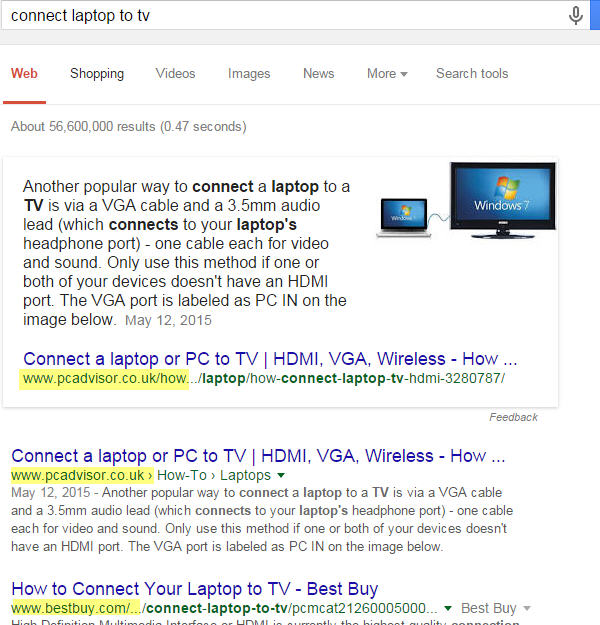
Small Business: How To Build Your Online Brand
Want a prime example of this? Simply do a Google search for “Small business SEO”. Ideally, who should compete for this term? A small business, right?
Nope. The first result, 5 Ways Small Businesses Can Compete With Giants in SEO, comes from Entrepreneur media. Check out their LinkedIn profile, which currently lists 1,832 employees. And this does not even factor in the hundreds of guest authors that write for them, one of whom is Jayson DeMers, who wrote the article.
The first page of the search engine results for small business SEO is littered with similarly profiled companies. Moral of the story: Your small business website doesn’t have a chance of competing in the same keyword sandbox where the big boys play.
If these articles appear on authoritative websites, what could they possibly know about small business SEO? After all, articles on sites such as Entrepeneur.com will almost always shoot straight to the top of the SERPs (search engine results pages) with little promotion necessary. How can an employer of thousands possibly understand your little 5 person company?
Ah, the good ole’ days: the way small business SEO used to be
When we pine about the good ole’ days in Internet land, we may be talking just a few short years (or months, sometimes) ago. Now, you are only as good as the latest Google algorithm allows.
Let me show you an example from back in 2008.
Back then, I realized that people wanted to connect their laptops to their new LCD TVs but did not know how to do it. So, I thought, I will create the best post on how to connect laptops to LCD TVs and I will give it proper on-page SEO. I wrote this article and it progressively succeeded, acquiring the #1 spot in the Google SERPs and well over 100,000 views as you see in the graph below:

In 2008, you could find unique search phrases like this, write a great article about the topic, and gradually achieve a #1 ranking for the term.
Now, an article like this typically requires that you be an authority in the tech-tips space. Just take a look at the current search results for “connect laptop to TV” in the graphic below (highlights indicate the authority domains that now occupy the space):

Small business domain authority and the catch-22
“Why bother?” With great frustration that quality content does not rank highly on a new website, many people ask this question.
You will find many who say that it’s still all about quality content. “Just create quality content and they will come.” That’s a big web marketing lie.
Even those who claim that they did nothing but create great content are usually not telling the truth. In fact, one enterprising blogger named Matthew Woodward, whose articles I really enjoy, wrote a great piece about how he built a top 100 blog in 12 months without any SEO or link building. However, one of his key strategies was finding people on forums and social media, which is a prime link building and SEO strategy.
So why spend your time writing great content if it will not be read? It seems like a great waste of time, does it not?
Sure, you can build quality inbound links by notifying influencers in the industry and building social media awareness about your content. And, if you’re fortunate and do get some quality inbound links, you will see some success.
But, frankly, until you gain some authority, it will take a long time for you to do all of this promotion and get eyeballs on your content.
Building small business website authority is a catch-22. You need lots of great, quality content to become a recognized authority, but you have no time to create this content when you need to be promoting all the time.
Not to mention that for many of you, small business SEO is a side activity and not your main business.
So where should you concentrate your SEO and online marketing time?
Gain domain authority by contributing to authoritative domains
I have a saying: “You have to fraternize with the big players to become a big player”.
Let’s use an analogy of an exclusive golf club (think Augusta and the Masters). There are very few members in this club but, once a member, you are considered part of the “it” crowd (e.g. immediate respect from Google). The members will throw a few parties for guests, inviting only those who have demonstrated great potentiality. Eventually, if they like you, you will be invited to be part of this club. Once in, you too are well-branded and implicitly granted authority.
In this analogy, how do you demonstrate great potentiality? You contribute content to authoritative websites—the big players!
Most of you think you are doing this by sharing and promoting your content on social media. And, this is a good strategy because lots of inbound links come from the Facebooks and LinkedIns of the world. But it’s not the best.
Let’s take a look at an example of the best way for a small business to gain website authority.
How a small business website becomes a Google authority: An Example
Fortunately, we need look no further than Jayson DeMers to answer this question. Jayson, a recognized expert in small and mid-sized business online marketing, posts for Entrepreneur (also Forbes, Inc., Huffington Post, etc.) but he is also the owner of Audience Bloom, an SEO firm based out of Seattle. Ask yourself: Why would Jayson spend his valuable time writing for other publications instead of his own?
Answer: Because he is building brand awareness for his own company and he knows that the best way to do this is through already well-branded properties. Jayson can write a post for a publication like Entrepreneur and it will shoot to the top of the SERPs. Jayson then has more eyeballs on his content—his brand, and he (and his company) will eventually reach the point of authority in the eyes of Google.
And Jayson is a content creation machine. Take a look at his profile on these various outlets: Forbes, Entrepreneur, Inc., Search Engine Watch, Search Engine Journal, Huffington Post, Small Business Trends…and that’s not even all of them!
By my completely unscientific count, Jayson has already written 38 articles for these sites in the month of July alone…and we are only 3 weeks into the month. How does he even have time to work for his company with this prolific output?
And what about his company blog? How many posts has Jayson written for his Audience Bloom blog this month? Answer: Zero.
I can’t even locate the last post Jayson wrote for his company blog.
What does all of this say?
It tells you that Jayson, an expert in the field of small business online marketing, sees more value in writing for external publications than he does in writing for his own website.
What does he gain from posting on all of these authority sites?
Well, he gains lots of eyeballs on his brand. On each of these sites, Jayson garners a mention and a link for his own company (which builds authority for his site) and a level of credibility in the eyes of his customers.
Imagine a customer asking Jayson about the value of Instagram for their business? And, after a brief response, he can also add: “You should check out my Instagram article on Forbes for more information.”
That’s insta-credibility.
People just assume a Forbes author must be the crème-de-la-crème and no more questions need to be asked.
But, at what point can Jayson untether? At what point can he stop contributing to the big players because he is a big player? At what point can Jayson start publishing to his own blog and beat the Forbes and Huffington Posts of the world? At what point will his small business be the authoritative brand?
Jayson’s earliest post on Forbes appears to be from April 2013. So, it’s been over 2 years of posting elsewhere. That’s a long time to develop a brand but a good lesson to all who want quick returns.
Quick returns are what AdWords provides. Building a small business brand is what Jayson is doing.
A typically numeric representation of a domain’s authority comes in the form of Google’s Pagerank. By this measurement, Jayson’s site will not beat Forbes. His site has a Pagerank of 5 compared to Forbes pagerank of 8.
So, today, Jayson continues to write for authority players while his own website has content produced by his employees.
Will Jayson ever untether?
That remains to be seen.
But clearly, as least for now, he derives more value from publishing his content on other authoritative domains than he does from publishing on his own site.
Building small business website authority and brand awareness: Conclusions
All small business owners face that difficult question: How do I complete with the big players? How does David take down Goliath?
Much of this depends on the market that you are in—your competitive atmosphere. Obviously, Jayson DeMers sees value in making massive contributions to these authoritative sites.
But, seriously, who has time to create that amount of web content (38 articles in 3 weeks?) and still do their regular job? A little voice in my head wonders if someone ghost writes this content but I’ll assume not. He has an honest face and I don’t know any different (though I do know many a CEO who has all of his material ghost-written).
What you can definitely learn about small business SEO from this article is that creating content for authoritative websites gradually earns authority and branding for your own website.
Truly, you have to play with the big players to become a big player.


Comments 2
Fascinating to read such a great write-up that included so much of… me! Great read, Richard, and you totally nailed it. Building a brand on external publications is hugely valuable for not only my personal brand, but AudienceBloom’s brand as well. Furthermore, it adds a ton of value for the publishers; I’m commonly told my articles are among the most popular on the site, by multiple publishers. Many ask me for more than I have time to write!
At AudienceBloom, I’m in charge of sales and marketing, and content marketing is not only what I preach, but what I practice. I wouldn’t dedicate so much time to publishing external content if it didn’t seriously work! =)
Thanks for an awesome write-up!
-Jayson
Author
Jayson,
Thanks for the comment.
One of the reasons why I included your story is that I frequently come across your writings on the various sites mentioned in the article. Clearly, your strategy is a good one and you’re providing great content on the many challenges that small businesses face when it comes to online success.
Again, many thanks and I look forward to more great content!
Cheers,
Richard